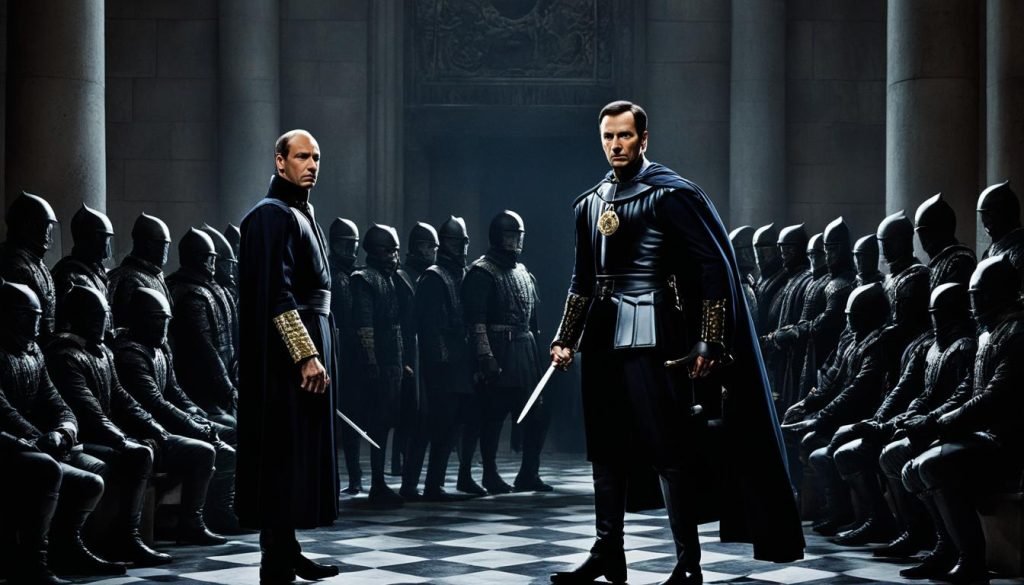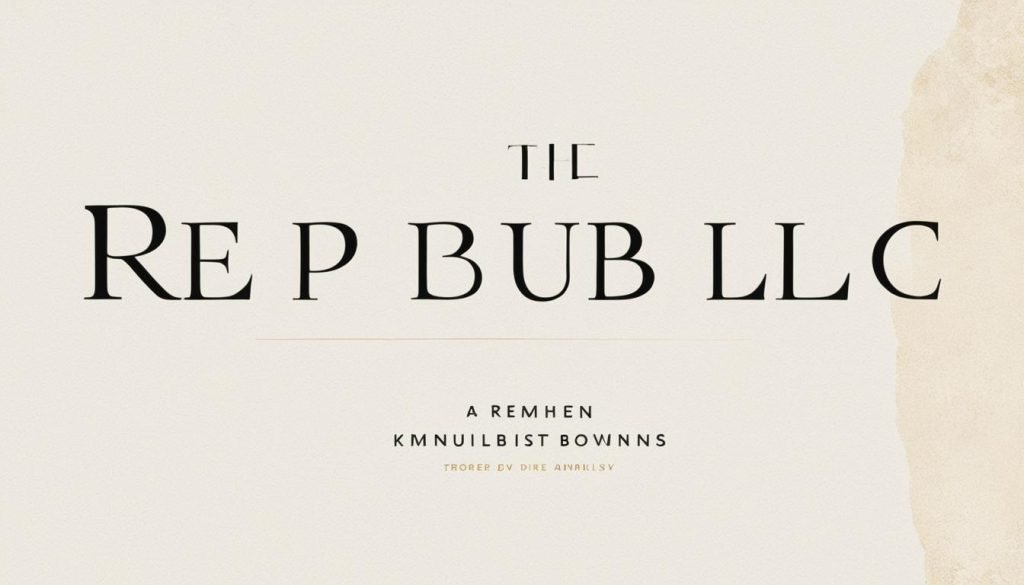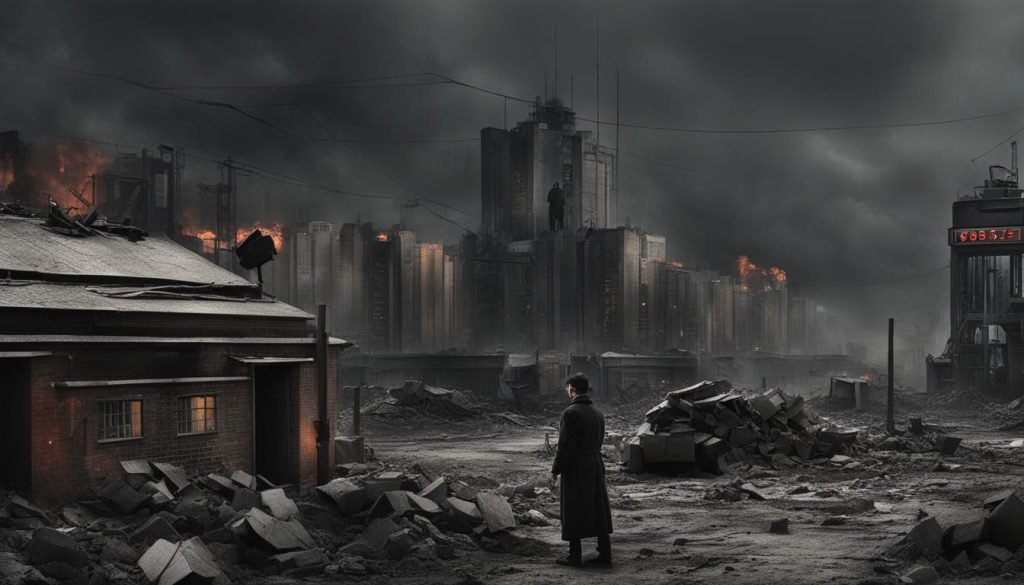Are you looking for the best books for men that will expand your mind, ignite your imagination, and leave a lasting impact? Look no further! We’ve curated a collection of must-read books for men that will captivate and inspire you.
Whether you’re looking for classic literature, thought-provoking philosophy, gripping biographies, or thrilling adventures, we’ve got you covered. These books have been carefully selected to offer diverse topics and genres that cater to every man’s interests.
With titles that delve into the depths of human nature, challenge societal norms, and offer invaluable insights into history and politics, these books will leave a lasting impression on you. Each page turned will transport you to new worlds, introduce you to complex characters, and stimulate your intellect.
So, whether you’re a lover of fiction or prefer the exploration of non-fiction, our list of best books for men will satisfy your literary appetite and provide hours of entertainment and enlightenment.
Get ready to embark on a journey through the pages of these remarkable books that will shape your perspective and leave an indelible mark on your soul. Start exploring our collection, and discover the transformative power of a great book.
The Great Gatsby by F. Scott Fitzgerald
“The Great Gatsby” is set in 1920s New York City and is considered one of America’s great literary products. The book explores themes of reliving the past and the lessons one can learn from it. The metaphors, beautiful writing, and the exploration of ideas make it a must-read for any man.
Experience the captivating world of Jay Gatsby and the Jazz Age in F. Scott Fitzgerald’s masterpiece, “The Great Gatsby.” Transport yourself to the lavish parties, mysterious pasts, and tragic relationships that define this iconic novel. Fitzgerald’s exquisite prose and evocative descriptions tell a tale of love, ambition, and the pursuit of the American Dream.
Immerse yourself in the decadence and glamour of the Roaring Twenties as you follow the enigmatic Jay Gatsby’s quest for love and acceptance. The novel delves into themes of social class, the illusion of wealth, and the fleeting nature of happiness. Fitzgerald’s portrayal of the human desire for reinvention and the consequences of unattainable dreams resonates with readers today.
Expanding beyond a simple love story, “The Great Gatsby” delves into more profound questions about identity and the pursuit of happiness. It examines the lengths individuals will go to recreate the past and the price paid for not embracing the present. The juxtaposition of wealth and moral decay and the exploration of the American Dream make this novel a timeless classic.
With his vivid descriptions and distinctive narrative style, Fitzgerald skillfully captures the essence of an era and the complexities of the human condition. From the mysterious allure of Gatsby himself to the characters’ disillusionment, “The Great Gatsby” transports readers to a world of luxury, tragedy, and unfulfilled desires.
The Prince by Niccolo Machiavelli
“The Prince” by Niccolo Machiavelli is a political masterpiece that has stood the test of time. This influential book is a classic guide on acquiring and maintaining political power, offering valuable insights into the motivations and actions that govern modern politics. Machiavelli raises essential questions about the ethical considerations of political actions and the justification of means in achieving power.
In “The Prince,” Machiavelli delves into the strategies and tactics necessary to succeed in the complex world of politics. He explores the practicality of cunning and force, emphasizing the importance of adapting to ever-changing circumstances. The book presents a pragmatic approach to leadership that resonates with readers centuries after its publication.
“The Prince” provides lessons on leadership, diplomacy, and the art of negotiation through historical examples. It challenges conventional notions of morality, advocating using any means necessary to achieve desired political outcomes. Machiavelli’s blunt and realistic assessment of human nature and the nature of power has made “The Prince” a controversial but highly influential work.
“The Prince” is an essential read for anyone interested in politics. It offers a unique perspective on the intricacies of political maneuvering and provides invaluable insights into power dynamics. Whether you are a political science student, a budding politician, or simply curious about the complexities of governance, “The Prince” is a must-read book that will broaden your understanding of the political landscape.

Key Takeaways from “The Prince” by Niccolo Machiavelli:
- Machiavelli emphasizes the pragmatism of power and the necessity of taking calculated risks in politics.
- The exploration of the ethical considerations and justification of using questionable means to achieve political goals.
- The importance of adaptability and flexibility in leadership.
- Lessons on leadership, diplomacy, and negotiation are drawn from historical examples.
- The controversial nature of the book and its lasting influence on political thought.
Band of Brothers by Stephen Ambrose
“Band of Brothers” is a gripping account of the men of Easy Company during World War II. The book tells the story of their experiences, hardships, and the bond they formed as soldiers. It provides a profound insight into the sacrifices made by these brave men and their unwavering loyalty to one another.
Stephen Ambrose, a renowned historian and author, meticulously researched and interviewed the surviving members of Easy Company to create this compelling and authentic narrative. Through his vivid storytelling, Ambrose brings to life the harrowing realities of war and the camaraderie that develops among soldiers.
Critical Themes in “Band of Brothers”
- Loyalty and Brotherhood: The book explores the deep bond forged between the men of Easy Company as they faced incredibly challenging circumstances together.
- Leadership and Sacrifice: The story delves into the leadership qualities displayed by officers such as Richard Winters and the sacrifices made by individuals for the greater good.
- Horror and Humanity: “Band of Brothers” doesn’t shy away from depicting the horrors of war while also showcasing acts of bravery and compassion amidst the chaos.
| Book Details | |
|---|---|
| Author | Stephen Ambrose |
| Genre | Non-fiction, Military History |
| Publication Year | 1992 |
| Synopsis | “Band of Brothers” follows the extraordinary journey of Easy Company, 506th Parachute Infantry Regiment, 101st Airborne Division, from their training days to the battles across Europe during World War II. The book provides an intimate and powerful account of the individual struggles, triumphs, and sacrifices that defined this remarkable group of soldiers. |
The Republic by Plato
“The Republic” is a Socratic dialogue that explores the concept of justice and how a just society should be structured. This influential work of philosophy and political theory delves into the immortality of the soul, the role of the philosopher in society, and the meaning of justice. It challenges readers to examine their beliefs and values, provoking thoughtful introspection and intellectual discourse.

Plato, the ancient Greek philosopher and student of Socrates, presents his ideas through dialogues, with “The Republic” being one of his most significant contributions to Western philosophy. In this thought-provoking book, Plato examines the nature of knowledge, the purpose of education, and the ideal forms that exist beyond the physical world.
Plato’s “The Republic” offers a vision of an ideal society governed by philosopher-kings who possess wisdom and moral integrity. Throughout the dialogue, Plato explores complex topics such as the nature of justice, the role of individual responsibility, and the importance of cultivating a just soul. He challenges conventional wisdom and encourages readers to question societal norms and strive for a more virtuous existence.
This philosophical masterpiece remains relevant today, addressing timeless questions about the nature of reality, the pursuit of truth, and the foundations of a just society. It is a profound exploration of human nature and a testament to the power of philosophical inquiry.
The Themes Explored in “The Republic”
- Justice and Its Manifestations: Plato examines various forms of justice, from individual to societal, and posits that an ideal society must be rooted in justice.
- The Immortality of the Soul: Plato explores the concept of the eternal soul and its inherent connection to higher truths and the world of Forms.
- The Philosopher as Ruler: According to Plato, philosophers possess the wisdom and knowledge to govern and guide society toward justice and virtue.
- The Allegory of the Cave: Plato introduces a metaphor that illustrates the process of enlightenment and the challenges individuals face in perceiving the truth.
Plato’s “The Republic” is a seminal work that continues to shape philosophical and political discourse. Its exploration of justice, the nature of the soul, and the philosopher’s role in society make it an essential read for those interested in deepening their understanding of philosophy and its implications for the human experience.
The Wealth of Nations by Adam Smith
If you’re looking for a comprehensive introduction to the principles of capitalism and free market policies, The Wealth of Nations by Adam Smith is a must-read. Published in 1776, this timeless book explores the concept of self-interest and its role in shaping economic systems.
Adam Smith, a Scottish economist and philosopher, delves into the invisible hand theory, arguing that individuals pursuing their self-interest contribute to society’s overall wealth and prosperity. This groundbreaking work laid the foundation for modern economics, influencing economic policies and discussions today.
Through meticulous analysis and insightful observations, Smith examines various economic concepts, including supply and demand, division of labor, and the role of markets. By illustrating the benefits of free trade and competition, Smith advocates for limited government intervention in economic affairs, emphasizing the importance of individual liberty and economic freedom.
Moreover, The Wealth of Nations addresses essential topics such as taxation, wealth distribution, and the role of labor. It offers valuable insights into the mechanisms that drive economic growth and prosperity. Whether you’re a student, entrepreneur, or simply interested in understanding the fundamentals of economics, this book is an invaluable resource.
The Call of the Wild by Jack London
“The Call of the Wild” is a thrilling adventure book that transports readers into Alaska’s rugged and untamed wilderness. Written by Jack London, this classic novel follows the extraordinary journey of Buck, a domesticated dog forced to embrace his primal instincts to survive in the harsh Arctic environment.
In this captivating tale, Buck goes through trials and tribulations, navigating the treacherous landscapes and encountering diverse characters. The story explores themes of resilience, survival, and the transformative power of nature, capturing the essence of the human-animal connection.

Jack London’s vivid writing style and masterful storytelling captivate readers from start to finish, immersing them in the raw and unforgiving beauty of the Alaskan wilderness. The book offers a thrilling escape into a world where instincts reign supreme and the call of the wild cannot be ignored.
For adventure enthusiasts and nature lovers, “The Call of the Wild” is a must-read. It will leave you inspired, amazed, and yearning for your wilderness adventure, making it a timeless classic in the genre of adventure books for men.
Theodore Roosevelt Trilogy by Edmund Morris
The Theodore Roosevelt Trilogy, authored by renowned biographer Edmund Morris, provides a deep dive into the extraordinary life of Theodore Roosevelt, one of the most influential figures in American history. This comprehensive biography spans three volumes, covering Roosevelt’s life, political career, and thrilling expeditions.
Roosevelt, known for his adventurous spirit and leadership qualities, led a remarkable life that continues to captivate readers today. Edmund Morris expertly delves into Roosevelt’s childhood, journey through academia, and rise to political prominence, highlighting the events that shaped his character and beliefs.
The trilogy explores Roosevelt’s time as the 26th President of the United States, where he introduced progressive reforms, championed conservation efforts, and played a pivotal role in shaping American foreign policy. Morris meticulously portrays Roosevelt’s challenges and triumphs during his presidency, shedding light on his keen intellect, bold decision-making, and unwavering dedication to public service.
Furthermore, the trilogy uncovers Roosevelt’s passion for exploration and involvement in groundbreaking expeditions, including his exploration of the Amazon rainforest and his leadership of the Rough Riders in the Spanish-American War. These adventures reveal Roosevelt’s indomitable spirit and thirst for adventure, further establishing his legacy as a man of action.
With detailed research and engaging storytelling, the Theodore Roosevelt Trilogy by Edmund Morris offers readers an immersive and inspiring journey through the life of a true American icon. Whether you are a history enthusiast, a fan of political biographies, or simply seeking to be inspired by an extraordinary individual, this trilogy is a must-read for any man looking to delve into the fascinating life of Theodore Roosevelt.
1984 by George Orwell
Immerse yourself in the haunting dystopian world of “1984” by George Orwell. Set in a future totalitarian society, this thought-provoking novel explores the themes of government surveillance, thought control, and the power of language. George Orwell’s masterpiece warns about the dangers of authoritarianism and emphasizes the importance of individual freedom.
Enter a world where Big Brother watches your every move, and the truth is manipulated to serve the ruling Party’s interests. In this oppressive society, the protagonist, Winston Smith, dares to rebel against the oppressive regime, risking everything for truth and personal freedom.
1984 delves deep into the ramifications of a world stripped of privacy and individuality, where “Newspeak” controls thoughts and erases rebellious ideas. It enthralls readers with its vivid portrayal of a bleak future and raises critical questions about the nature of power and the value of human autonomy.

| Book Details | Author | Genre |
|---|---|---|
| 1984 | George Orwell | Dystopian |
| First Published | June 8, 1949 | Language |
| Publisher | Secker & Warburg | English |
George Orwell’s 1984 resonates with readers today as a stark reminder of preserving individual freedoms and challenging the status quo.
Brave New World by Aldous Huxley
“Brave New World” is Aldous Huxley’s captivating science fiction masterpiece. Set in a technologically advanced society, the book explores a future where individuality is suppressed and conformity is strongly encouraged. Huxley’s thought-provoking narrative raises essential questions about the nature of happiness, the role of government, and the perils of a society driven by hedonism and uniformity.
In this dystopian world, humans are genetically engineered and conditioned from birth to fulfill pre-determined roles in society. Pursuing pleasure and instant gratification has replaced deeper human connections and meaningful experiences. Huxley challenges readers to reflect on the consequences of sacrificing individuality and personal freedom for a state of perpetual comfort and stability.
The themes explored in “Brave New World” resonate with readers of all genders. Still, the book holds particular appeal for men who are interested in science fiction and thought-provoking literature. It offers a unique perspective on the potential dangers of a society governed by technology and control.
Throughout the novel, Huxley’s poetic prose and vivid storytelling transport readers to a world that is both eerily familiar and disturbingly different from our own. The book’s compelling characters and intricate plot keep readers engaged from start to finish, prompting deep introspection and stimulating conversations about Humanity’s nature and society’s future.
With its timeless relevance and powerful exploration of themes, “Brave New World” remains a must-read for anyone interested in science fiction, dystopian literature, and thought-provoking books that challenge societal norms.
- The suppression of individuality and the promotion of conformity
- The role of technology in shaping society
- The dangers of a society driven by hedonism and instant gratification
- The exploration of happiness and its relationship to personal freedom
- The consequences of sacrificing authenticity for stability
By delving into these themes, Aldous Huxley challenges readers to question the values and norms of their society, making “Brave New World” a thought-provoking and relevant read for men interested in science fiction literature.
| Book Details | Author | Genre |
|---|---|---|
| “Brave New World” | Aldous Huxley | Science Fiction |
How to Win Friends and Influence People by Dale Carnegie
“How to Win Friends and Influence People” by Dale Carnegie is a timeless self-help book that offers valuable insights and practical techniques to improve your interpersonal relationships for personal and professional success. Whether you seek to enhance your social skills, build meaningful connections, or become a more influential communicator, this book provides a roadmap for achieving these goals.
Carnegie’s book emphasizes the importance of effective communication, teaching readers how to engage in meaningful conversations, actively listen, and express genuine interest in others. By mastering these skills, you can establish rapport, foster trust, and create lasting relationships that will benefit you personally and professionally.
Furthermore, “How to Win Friends and Influence People” offers guidance on positively influencing others without manipulation or coercion. It teaches strategies for inspiring others, bringing them to your thinking, and resolving conflicts amicably. These techniques can empower you to navigate various social and professional situations confidently and honestly.
For men seeking personal growth and enhanced social competence, “How to Win Friends and Influence People” is a must-read. By applying the principles and techniques outlined in this book, you can develop the skills necessary to build strong relationships, increase influence, and succeed in all areas of your life.
Author
-

Hey there! I'm Andrew Reed, and I live for the thrill of writing reviews. Dive into my world at bestfordaily.com, where I unpack stories behind products and experiences. I'm all about sharing my unique take on things, infusing each review with my youthful enthusiasm and a dash of social flair. Join me on this exciting journey—I promise you won't just read reviews; you'll experience them!
View all posts






